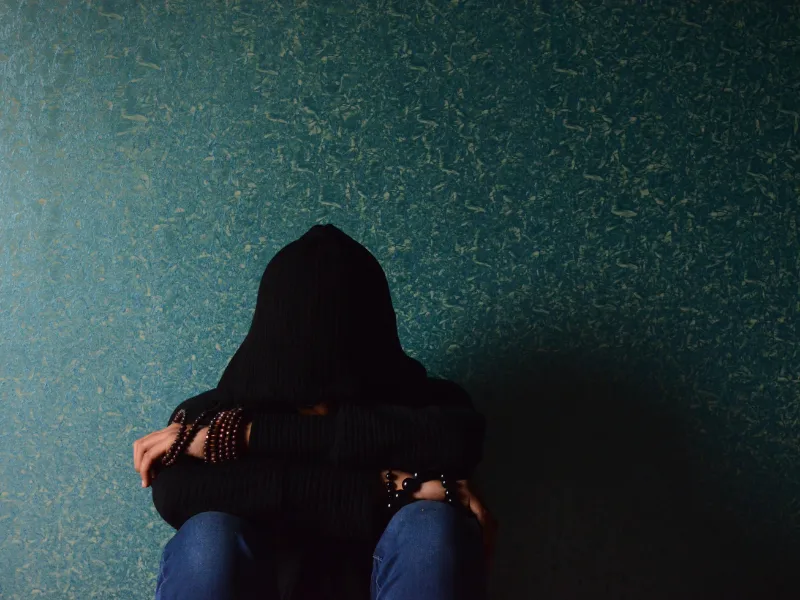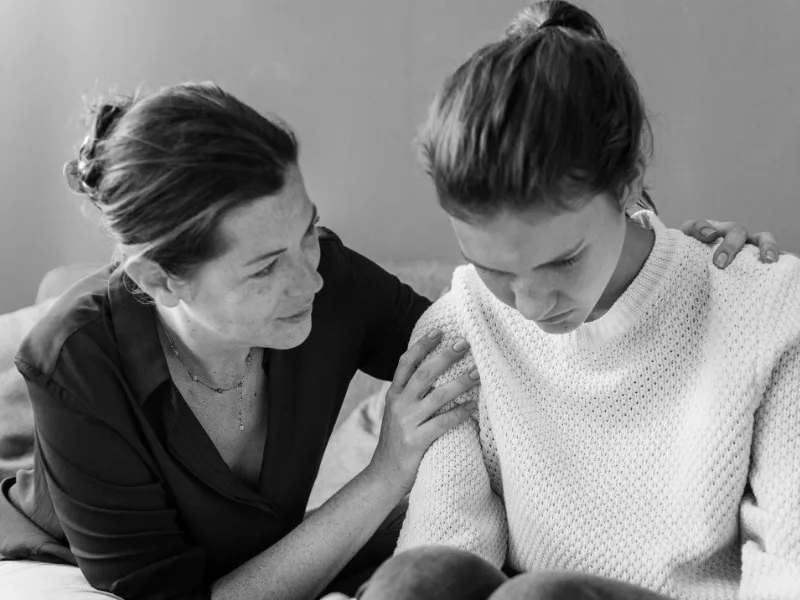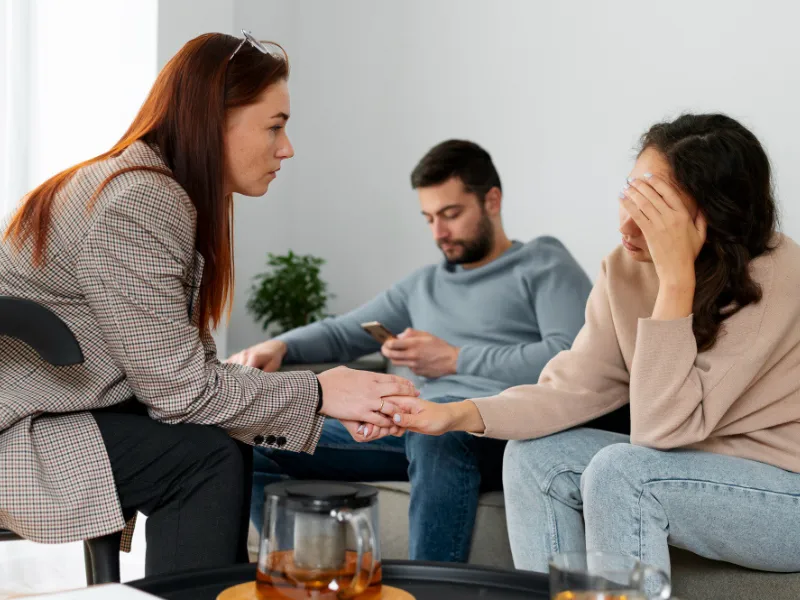Can You Get Postpartum Depression after Miscarriage?
Published: 26 Apr 2025
Did you know that nearly 1 in 5 women experience depression symptoms after a miscarriage? While many associate postpartum depression with childbirth, the truth is, you can get postpartum depression after a miscarriage, too. The sudden hormone drop, emotional trauma, and unspoken grief can all play a role. (1)
By the end of this article, you’ll understand the signs, the science, and the support options available for healing.
1- Can You Get Postpartum Depression after Miscarriage?
Yes, postpartum depression can occur even after a miscarriage. (2) Many women don’t expect these feelings, which makes it harder to cope or seek help.

Real-Life Example: On Reddit, one woman shared how she felt “numb and empty” for weeks after losing her baby at 9 weeks. She said, “Everyone kept telling me it was early, but it still broke me. I cried in the shower every night and didn’t know why I couldn’t ‘just move on.’”
This kind of emotional pain is real. And it’s valid.
2. What Happens to the Body and Mind After a Miscarriage?
Miscarriage isn’t just a physical event, it’s an emotional storm. Even if it happens early, your body and brain go through huge changes, just like after childbirth.
Let’s break down what really happens, both inside and out.
2.1 Hormonal Crash: Why It Hits So Hard
It’s like hitting the brakes hard on an emotional rollercoaster. One moment, you were planning names, and the next, you’re trying to breathe through the silence.

- After a miscarriage, your pregnancy hormones, estrogen and progesterone, drop suddenly. These hormones are like emotional stabilisers. When they crash, your mood can spiral, too. (3)
- These hormone drops, paired with the emotional trauma and deep grief of pregnancy loss, can trigger symptoms of postpartum depression (PPD).
Studies show that hormonal fluctuations after pregnancy loss are linked to depressive symptoms, mood swings, and anxiety, similar to what new moms experience after giving birth.
2.2 Grief That Cuts Deep (Even If It Was Early)
Grief after a miscarriage hits differently. There’s sadness, yes. But also guilt, shame, confusion, and sometimes even numbness.
Some women blame themselves, thinking, “What did I do wrong?” Others feel disconnected from the world around them. But here’s the truth: Not everyone grieves the same way. And that’s okay.

Some cry every night. Some feel nothing at all. Both are valid. These quiet stories show how deep and invisible the pain can be.
2.3 When Your Body Heals Faster Than Your Heart
Here’s the tough part: your body may heal faster than your heart. The bleeding might stop in a week or two. But the emotional wound? That continues.

“Just because the bleeding stops doesn’t mean the pain disappears.” Some women return to work, care for others, or even try to “move on”, while inside, they’re still aching.
3. What Is Postpartum Depression After Miscarriage?
Yes, postpartum depression (PPD) can happen even after a miscarriage. It’s not just about “feeling sad”; it’s a serious mental health condition that needs attention and care.

Let’s look at how it’s different from regular grief and how to recognise the signs.
3.1 How PPD Feels Different from Grief
Grief is a natural response to loss. It comes in waves, some days feel okay, others feel heavy.
But postpartum depression is deeper. It lingers. It can take over your thoughts, your energy, and your ability to function.
Here’s a simple comparison:
| Grief After Miscarriage | Postpartum Depression (PPD) |
|---|---|
| Comes in waves; mood can vary | Low mood is constant or gets worse over time |
| Still able to feel some joy or connection | Feels numb, disconnected, or hopeless |
| Usually improves gradually | Lasts longer than 2 weeks, worsens |
| You can still function day to day | Hard to eat, sleep, or even get out of bed |
| Doesn’t always need treatment | Often needs support or therapy |
Grief is normal. But if it starts interfering with your daily life or feels unbearable, it might be more than grief.
Postpartum depression after a miscarriage may show up in different ways. You might notice:
- Constant sadness or crying spells
- Feeling numb, hopeless, or empty
- Pulling away from friends or loved ones
- Trouble sleeping or sleeping too much
- Sudden anger, irritation, or restlessness
- No interest in things you used to enjoy
- Dark thoughts, like “What’s the point?” or “I don’t want to be here anymore”
If you ever have suicidal thoughts or feel like you can’t go on, please don’t stay silent. You deserve help. Talk to a trusted doctor, call a mental health helpline, or speak to someone you trust.
“I felt like my life stopped with the miscarriage, but everyone else just kept going.” — A woman on Quora.
You’re not alone. And you don’t have to handle this alone either.
4. How Common Is It to Feel Depressed After a Miscarriage?
It’s more common than most people think, and way less talked about than it should be.
Studies show that 10% to 20% of women experience clinical depression symptoms after a miscarriage, especially in the first few weeks to months.
In another study, researchers found that 1 in 10 women still showed depression symptoms even 3 years after a pregnancy loss. That’s not a small number. But here’s something even more important to remember:

“But numbers don’t show the whole picture. Every story is personal.” You’re not just a statistic. Your pain, your healing, and your emotions are real, even if others can’t see them.
“People told me it was early, just a few weeks, but to me, it was a baby, and I loved it.” A woman’s story from Reddit
So yes, depression after miscarriage is common, but that doesn’t make it any less serious. And it absolutely deserves care and attention.
| 5. How to Cope When the Pain Feels Too Heavy |
|---|
Coping with depression after a miscarriage is an incredibly personal journey, but there are steps you can take to help yourself heal. 5.1 Talk It Out (Even If It’s Just to Yourself)It’s easy to feel isolated after such a loss, but talking about it is one of the most powerful ways to heal. You don’t have to go through this alone.  Speak with someone you trust, whether it’s your partner, a close friend, or a therapist. Sharing your emotions can help you process your grief and lift some of the weight off your shoulders. It’s normal to feel vulnerable, but opening up can help you feel less alone. Tip Journaling can also be a therapeutic way to process your feelings. Sometimes, putting words on paper helps organise and make sense of the emotional chaos in your mind. 5.2 Lean on a Support System That Gets ItSupport is crucial, and it’s comforting to know that there are communities of people who understand what you’re going through. Look for support groups, whether they’re online or local. Being part of a community where you can share your story, listen to others, and receive encouragement can be incredibly healing.  There are online forums like r/miscarriage on Reddit or BabyCenter where women come together to talk about their experiences and offer support. You might be surprised how much comfort you can find in knowing that others are walking a similar path. 5.3 Professional Help Isn’t Weakness—It’s StrengthWhile it can be tough to ask for help, it’s often the best step you can take for your mental health. If you find that depression is taking a toll on your daily life, consider seeking professional help.  When should you see a therapist or doctor? If you’re feeling overwhelmed, struggling to function, or experiencing symptoms like persistent sadness, anger, or even thoughts of self-harm, it’s important to talk to a healthcare provider. Therapists can help you explore your feelings and offer coping strategies, and medications may also be an option if needed. There’s no shame in seeking help; taking care of your mental health is just as important as taking care of your physical health. |
6. What Partners and Loved Ones Can Do to Help
Miscarriage can deeply affect relationships. Here’s how you can support someone going through it:
6.1 Be Patient and Present
Grief isn’t linear. There will be ups and downs. Don’t pressure them to “move on” quickly. Just being there, sitting quietly, holding their hand, or checking in can mean a lot. You don’t need perfect words. Your presence says enough.

6.2 Listen Without Trying to Fix It
It’s normal to want to help, but sometimes the best support is simply listening. Don’t rush to give advice or say things like “you’ll be okay.” Let them talk. Let them cry. Just nod, hold space, and say, “I’m here for you.”

6.3 Offer Comfort, but Respect Their Space
Sometimes, a hug or a quiet moment together is more healing than words. But also know when to step back. Everyone grieves differently. Pay attention to what they need, whether it’s closeness, space, or both at different times.
7. Real Stories of Depression After Miscarriage
People have shared the real stories on Reddit
- Feeling Alone
Many women say miscarriage grief feels deeper than sadness, more like a heavy emptiness they can’t explain. - Body Heals, Heart Doesn’t
Some recover physically fast, but emotionally, they feel stuck. The heart takes longer to heal. - Hormonal Rollercoaster
Hormone shifts after a miscarriage can make emotions worse. For many, their grief hits hardest when their cycle returns. - When Help Is Needed
Some women feel lost or hopeless. Talking to a therapist or doctor helps them feel supported and understood. - Quiet Support Matters
Just being there—listening without trying to fix things—can mean the world during such a painful time. - Not Realising It’s Depression
Many don’t recognise it’s postpartum depression at first. They think it’s just grief until it becomes too much. - Community Helps
Joining support groups makes women feel less alone. Sharing with others going through the same thing brings comfort and healing.
8. Quiz: Is It Grief or Something More?
Instructions: Answer the following questions honestly to help determine if what you’re feeling is more than just grief.
- Do you feel hopeless most days?
- Yes / No
- Yes / No
- Have you lost interest in things you once loved?
- Yes / No
- Yes / No
- Are you isolating yourself from family and friends?
- Yes / No
- Yes / No
- Do you feel guilt or worthlessness daily?
- Yes / No
- Yes / No
- Are you experiencing changes in your sleep patterns (sleeping too much or too little)?
- Yes / No
- Yes / No
- Do you have trouble focusing or making decisions?
- Yes / No
- Yes / No
- Do you have thoughts of hurting yourself or feeling like life isn’t worth living?
- Yes / No
- Yes / No
If you answered ‘yes’ to more than 3 questions, talk to a healthcare professional. You don’t have to go through this alone.
Curious to learn more? Check out our next article on Mental Health
9. Conclusion
So, guys, in this article, we’ve covered the question Can You Get Postpartum Depression after Miscarriage? in detail. Miscarriage is painful, and experiencing postpartum depression afterwards is something that many women face, but it’s important to remember that help is available.
My recommendation? Don’t be afraid to reach out for professional support or lean on loved ones during this difficult time. Healing is possible, you don’t have to do it alone. Start with a simple conversation today, and take that first step toward feeling better.
Found this helpful? Share it with your friends and drop a comment below if you have any questions.
10. Frequently Asked Questions (FAQs)
Yes, postpartum depression can happen after a miscarriage due to hormonal shifts, emotional trauma, and the grieving process. It’s important to recognise the signs and seek help if needed.
After a miscarriage, women may experience emotional disorders like depression, anxiety, or post-traumatic stress disorder (PTSD). It’s crucial to get support and professional help if these symptoms persist.
Depression after a miscarriage can last weeks to months, depending on individual circumstances. It’s important to be patient with your healing process and seek support if feelings of sadness last longer than expected.
Postpartum depression (PPD) is diagnosed when a person experiences deep sadness, anxiety, and other symptoms for at least two weeks after childbirth or miscarriage. These feelings affect daily life and are more intense than typical grief.
If you’re feeling hopeless, withdrawing from loved ones, or having trouble sleeping or eating, it could be a sign of postpartum depression. It’s important to talk to a healthcare provider for an accurate diagnosis.
Yes, it’s completely normal to feel sadness, grief, and even depression after a miscarriage. The emotional recovery can be just as challenging as the physical healing process.
If you suspect you have postpartum depression, reach out to a therapist, join a support group, or talk to your doctor. Getting help early can make a significant difference in your recovery.
Postpartum depression can develop shortly after a miscarriage, sometimes within a few weeks, as hormonal and emotional changes take place. It’s important to watch for symptoms early on.
Yes, partners can experience grief and depression after a miscarriage, too. Both partners need to support each other and seek help if needed.
Yes, therapy can be very helpful in managing postpartum depression after a miscarriage. It can provide a safe space to process grief and emotions, and therapists can offer strategies for coping with the mental and emotional impact.
11. References
At MedicaWire, all medically sensitive content is reviewed by licensed healthcare professionals. Our team ensures that the information you read is accurate, up-to-date, and based on trusted medical sources.
Learn how we maintain high standards by reading our Editorial Policy.
📚 Sources
1- Nynas, J., Narang, P., Kolikonda, M. K., & Lippmann, S. (2015). Depression and Anxiety Following Early Pregnancy Loss: Recommendations for Primary Care Providers. The Primary Care Companion for CNS Disorders, 17(1), 10.4088/PCC.14r01721. https://doi.org/10.4088/PCC.14r01721
2- Kukulskienė, M., & Žemaitienė, N. (2022). Postnatal Depression and Post-Traumatic Stress Risk Following Miscarriage. International Journal of Environmental Research and Public Health, 19(11), 6515. https://doi.org/10.3390/ijerph19116515
3- Farren J, Jalmbrant M, Falconieri N, Mitchell-Jones N, Bobdiwala S, Al-Memar M, Tapp S, Van Calster B, Wynants L, Timmerman D, Bourne T. Posttraumatic stress, anxiety and depression following miscarriage and ectopic pregnancy: a multicenter, prospective, cohort study. Am J Obstet Gynecol. 2020 Apr;222(4):367.e1-367.e22. doi: 10.1016/j.ajog.2019.10.102. Epub 2019 Dec 13. PMID: 31953115.
https://pubmed.ncbi.nlm.nih.gov/31953115
ℹ️ Our Promise
MedicaWire follows strict sourcing guidelines and only references peer-reviewed studies, academic institutions, and reputable medical associations. We update content regularly to reflect new health information.

- Be Respectful
- Stay Relevant
- Stay Positive
- True Feedback
- Encourage Discussion
- Avoid Spamming
- No Fake News
- Don't Copy-Paste
- No Personal Attacks



- Be Respectful
- Stay Relevant
- Stay Positive
- True Feedback
- Encourage Discussion
- Avoid Spamming
- No Fake News
- Don't Copy-Paste
- No Personal Attacks



